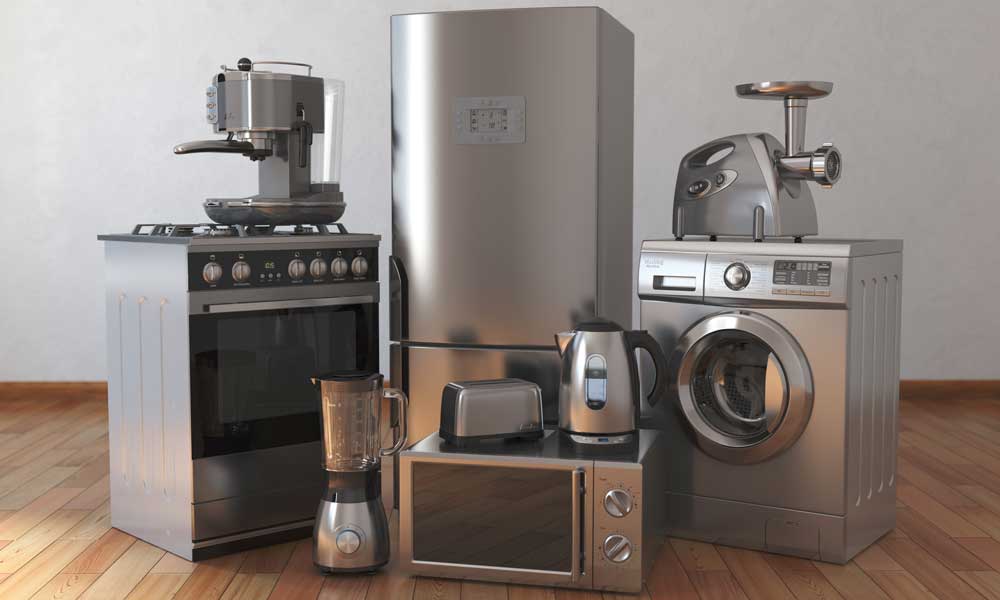4 Types of Warranties That Cover Home Appliances
Updated:
Retirement Living takes an unbiased approach to our reviews. We may earn money when you click a partner link. Learn More

Given the cost of new appliances these days, it might be worth investing in more than a hope and a prayer should one of your units break. Repairing a dishwasher, refrigerator, oven, or washing machine is not cheap. Fortunately, there are several types of home warranty policies that cover appliances, from traditional manufacturer warranties to extended warranties to home appliance warranties.
While they’re usually budget-savers, it’s important to remember that all these warranties become void if the appliance needing repair has not been used as intended.
Great Reputation
American Home Shield
- High appliance replacement limits
- Available in 49 states
Home Warranty
Home warranties are often purchased with older homes, but they can serve newer homes, too—especially if you bring in appliances from your last house. While home warranties cover repairs for big-ticket expenses like electrical and plumbing components, they can also include your existing appliances. Check out our home warranty guide to learn more about these maintenance contracts.
Who pays for a home warranty: You can buy this coverage as a home buyer, but it’s more common for the seller to foot the bill. Most home warranties have a deductible or trip fee you must pay before the appliance is repaired or replaced.
Manufacturer’s Warranty
A manufacturer’s warranty is a basic agreement from the manufacturer of the appliance that guarantees that product will continue to work for a specified amount of time, usually one or two years. If the appliance has any mechanical issues outside or normal wear and tear during this time, the company will repair or replace the appliance. Some manufacturer warranties are limited to certain parts of the machine, but most are fairly comprehensive.
Who pays for a manufacturer’s warranty: All manufacturer’s warranties require your original receipt to provide service, so hold onto it. As a general rule, the consumer doesn’t pay for a manufacturer warranty, and the appliance will be repaired or replaced at no cost

Home Appliance Warranty
A home appliance warranty (also offered by home warranty companies) covers the additional appliances within your home. These are not the same as extended warranties offered by retailers and manufacturers (more on that below). Instead, these are often plans you add on to your home warranty.
Home appliance warranties are also called service contracts, appliance protection plans, home maintenance plans or appliance repair plans.
Who pays for a home appliance warranty: The homeowner or purchaser. You may buy one of these warranties at the time you purchase a new appliance or within a year or so of buying one. There may be deductibles or other comparatively small expenses with a home appliance warranty.
Extended Warranty
When you purchase an appliance, the salesperson might ask if you’d like to add an extended warranty. As the name implies, this warranty lengthens the manufacturer’s warranty and is also issued by the appliance manufacturer. You can buy this at the time of purchase or up to one year before the end of your manufacturer’s warranty.
It’s worth noting that retailers make a huge profit on extended warranties, which might explain the hard sell you get at the cash register. However, they do cut down on the cost per repair.
Who pays for an extended warranty: The homeowner. These warranties apply to individual appliances, so you pay for exactly the coverage you want on the appliances you want covered.
Should You Consider a Home Appliance Warranty?
Appliance repairs typically cost between $100 and $250 per incident—this is in addition to the cost of the appliance new, which can range from $400 for a dishwasher to $2,000 for a water heater. Comparatively, a home warranty costs $300 to $600 per year. An extended warranty is more affordable at around $200 or less.
The monetary savings are obvious, but warranties on appliances might also be worth it if you aren’t particularly handy or knowledgeable in appliance repair. If your appliances are high-end and uber-technical, you might also benefit from a warranty that ensures trained technicians work on your units. As always, read the fine print and ask questions before paying for any type of home appliance warranty.
